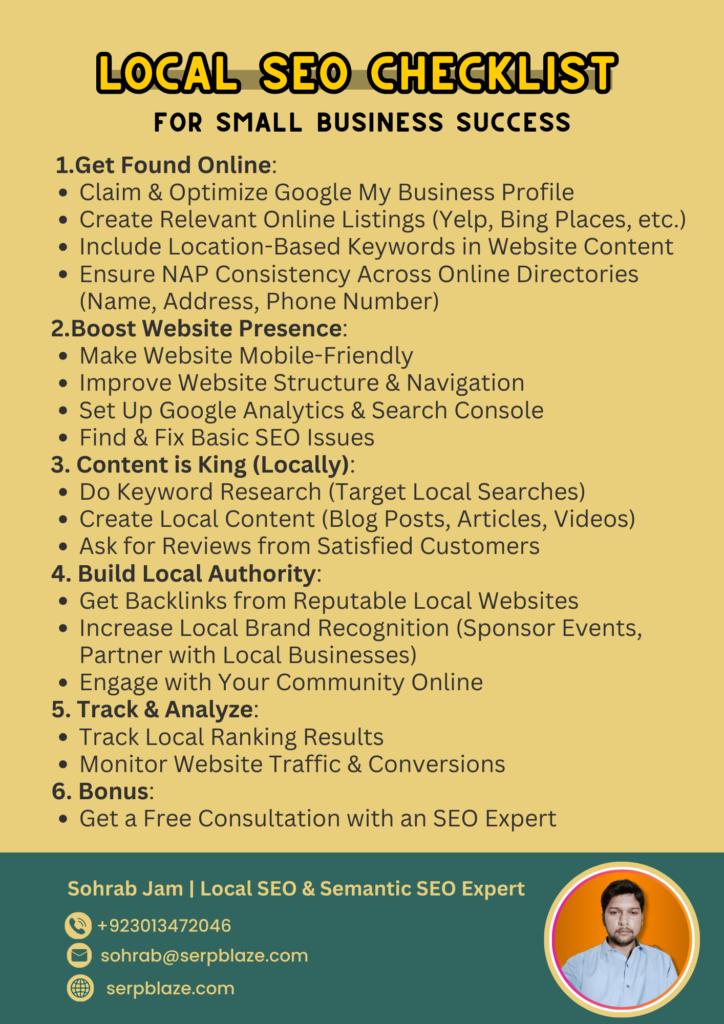Want to boost your business’s online visibility? Understanding local SEO basics is crucial. It’s the difference between being lost in the digital crowd and standing out like a beacon on a dark night. With local SEO, you can reach potential customers right at their doorstep. By optimizing for local searches, you’ll ensure that when someone looks for a product or service near them, your business pops up first.
Table of Contents
ToggleUnderstanding the Importance of Local SEO Basics for Small Businesses
Targeting Specific Geographic Areas
Local SEO is all about targeting specific geographic areas by optimizing any page to appear in local search ranking. This means that businesses can focus on reaching customers in their local vicinity, making it easier for potential customers to find and engage with them. Local SEO is a topic from the world of digital marketing.
For example, a small bakery in Houston would want to target people searching for “best cupcakes near me” or “artisan roofing company in Los Angeles.” By using this local SEO guide, the bakery can ensure that its website appears when people search for these terms within the specific area.
This targeted approach helps businesses connect with nearby customers who are more likely to visit their physical store or use their services.
Enhancing Visibility in Local Search Results
Implementing local SEO strategies enhances a business’s visibility in local search results. When someone searches for a product or service online, search engines like Google prioritize results based on the user’s location. Follow your Google search console and Google Analytics it shows what’s going on. People also use Google ads to promote their products or services to their local areas’ potential customer.
Differences Between Local and Traditional SEO
Global vs. Location-Based Targeting
Traditional SEO aims for a global audience, trying to reach people regardless of their location. On the other hand, local SEO focuses on targeting potential customers within a specific geographic area. For instance, if you have a bakery in New York, a local SEO strategy helps your business appear when someone in New York searches for “best plumber near me.”
Local SEO is all about ensuring that when people search for products or services in their area, they find your business first. You can show your local business to your targeted audience by getting local SEO services from experienced and certified local SEO experts. With this local search engine optimization you will get traffic, leads, and local customers that are already searching for the business or any service they want.
Optimizing Your Website and GMB for “Near Me” Searches
One key aspect of local SEO is optimizing for “near me” searches. When someone uses phrases like “restaurants near me” or “cleaning company near me,” they’re looking for businesses close to their current location. By optimizing your website and online presence with relevant keywords and location-specific information, you increase the chances of appearing in these search results. You can easily and effectively reach your potential customers by winning local search rankings from competitors.
For example, if you run a pet grooming salon in San Francisco and optimize your website with phrases like “pet grooming near Union Square,” you’re more likely to show up when someone nearby looks for pet grooming services.
Conducting Effective Local Keyword Research
Identifying Location-Specific Keywords
Identifying location specific keywords is crucial. These are words or phrases that include the name of a city, town, or region and are often used in local searches. For example, if you have a bakery in Seattle, relevant keywords could be “best cupcakes in Seattle” or “Seattle bakery near me.” By incorporating these specific keywords into your website’s content, you can better target potential customers in your area.
It’s important to understand what people are searching for when looking for businesses like yours within your geographic area. Using local SEO tools like Google Keyword Planner, Moz Local, and BrightLocal can help you discover the most popular searches related to your Google Places business listing and their respective search volume. This means finding out how many times a particular keyword is being searched for on Google each month.
Another effective strategy is considering long-tail keywords for local relevance. Long-tail keywords are more specific and usually longer phrases that visitors are more likely to use when they’re closer to making a purchase – such as “gluten-free birthday cakes downtown” instead of just “birthday cakes.”
Read more about The Ultimate Guide to Local Keyword Research for Business Growth
Optimizing Your Google Business Profile (GMB SEO)
Complete Information Accurately
Optimizing your Google Business Profile is crucial. Providing complete and accurate information about your business, such as the address, phone number, website URL, and business hours, helps potential customers find you easily. Make sure that the information matches what’s on your website and other online platforms. People use Google map to look for their desired location, service, or product they are interested in.
Your Google Business Profile should also briefly describe your business and the products or services you offer. Use relevant keywords naturally in the description to improve your chances of appearing in local searches. For example, if you own a bakery in Austin specializing in custom cakes, ensure that this detail is clearly mentioned.
Add High-Quality Images
In addition to detailed information, adding high-quality images of your business can significantly impact how potential customers perceive your establishment. Include pictures of the exterior and interior of your premises, showcasing any unique features or products you offer. For instance, if you run a cozy café with an outdoor seating area and signature desserts like red velvet cupcakes or matcha lattes, featuring these visually appealing elements can attract more visitors.
Encouraging Online Reviews on Your Profile Positive customer reviews play a vital role in establishing trust with potential customers who come across your profile. Encourage satisfied patrons to leave reviews on platforms like Yelp or directly on Google itself by providing exceptional service and politely asking for feedback after their visit.

Building a Strong Local Link Network
Seek Backlinks
Getting backlinks from local businesses, and directories, and creating local citations is crucial for local business SEO. These links act as upvotes, telling search engines that your website is reliable and relevant to the local community. For instance, if you run a bakery, having a link from the local Chamber of Commerce or neighborhood blog can significantly boost your visibility.
It’s essential to prioritize quality over quantity. A few high-quality backlinks from reputable local sources are far more valuable than numerous low-quality ones. Imagine it like this: one recommendation letter from your favorite teacher carries more weight than ten generic ones.
Leverage Local Events
Leveraging local events or sponsorships can also provide excellent opportunities for building local links. Suppose you sponsor a community event or participate in a charity drive; you may be featured on the event’s website with a backlink to your business site. This not only helps with SEO but also fosters goodwill within the community.
When seeking out these opportunities, keep in mind that relevance is key. If you’re sponsoring an event related to children’s education and running an educational toy store, that connection strengthens the impact of the backlink.
Enhancing On-Page Elements for Local Search
Including Location in Title Tags and Meta Descriptions
Including the location in title tags and meta descriptions is crucial. For instance, if you have a bakery in Seattle, make sure to include “Seattle Bakery” in the title tag and meta description of your website. This helps search engines understand that your business is relevant to local searches matching with local intent for bakeries in Seattle.
When optimizing content with local keywords, ensure that they naturally fit into the text. If you run a coffee shop in Portland, incorporating phrases like “best coffee shop in Portland” or “Portland’s favorite espresso” within your website’s content can significantly enhance its visibility for local searches. You can find untapped local keywords with any SEO tool like Semrush. You can do this optimization yourself or you can any agency or expert providing the exact local SEO service for your business.
Utilizing structured data markup for local business information further strengthens your on-page elements for local search optimization. By adding specific details such as address, phone number, operating hours, and customer reviews using structured data markup like Schema.org or JSON-LD, search engines can better comprehend and present this information to users searching for businesses similar to yours.
Read more: Exclusive Optimizing On-Page SEO for Local Business Success
Importance of Reviews and Social Media Engagement for Your Small Business
Encouraging Customer Reviews
Encouraging satisfied customers to leave reviews is crucial for local SEO basics. When potential customers are reading reviews, positive feedback can attract them to your business. For instance, you can politely ask satisfied customers to share their experience on platforms like Google My Business or Yelp.
Engaging with the local community on social media platforms also plays a vital role in boosting your online presence. By interacting with people through comments, likes, and shares, you’re showing search engines that your business is active and relevant.
Responding Professionally to Reviews
Responding to both positive and negative reviews professionally is essential for maintaining a good reputation. When people see that you value feedback and address concerns, they are more likely to trust your business. Google review in now a major trust factor that leads to decision-making. For example, if someone leaves a negative review, respond empathetically and offer a solution publicly.
Social media engagement allows you to connect with potential customers on a personal level. By sharing local events or showcasing behind-the-scenes glimpses of your business, you can build rapport with the community while improving visibility online.
Advanced Strategies for Local SEO Success
You must have a strategy to follow your success in local search engines. You can follow the Local SEO Checklist to improve your local ranking, whether you are creating content for a local audience, doing off-page SEO like local citation, using the consistent NAP values (Name, Address, and phone number) across the each platform, or creating Google posts from your Google Business Profile. One important local SEO tip is to go with the local keyword that people from that area are searching for. These are some of the major local SEO ranking factors to dominate in local search results.
Mobile-Friendly Website Design
Having a mobile-friendly website is crucial for local SEO. It ensures that your site looks good and functions well on mobile devices, which is important since many people use their smartphones to search for local businesses. When your website is easy to navigate on a phone, it can lead to more visitors and potential customers.
For instance, if someone searches for “best pizza near me” on their phone and comes across a restaurant’s website that isn’t mobile-friendly, they might quickly leave the site due to difficulty in navigating or reading the content. This could result in a lost opportunity for the restaurant.
Another example of this would be when you’re looking up store hours while out running errands; if you can’t easily find the information because the website isn’t optimized for mobile viewing, you might move on to another business instead.
Google My Business Posts
Using Google My Business posts for your small business allows you to share updates and promotions directly on Google Search and Google Maps. This feature enables you to engage with potential customers by providing them with current information about your business. By regularly posting updates such as new products or upcoming events, you can attract more attention from local searchers.
For instance, a coffee shop could post about an upcoming live music event they are hosting or promote a limited-time offer on seasonal drinks through Google My Business posts. So people can find you through Google Maps.
Utilizing these strategies alongside engaging with reviews and social media will help boost your local SEO efforts significantly.
Closing Thoughts
You’ve now got the lowdown on local SEO basics guide. By understanding the unique needs of local search, mastering keyword research, optimizing your Google Business Profile, building a strong link network, and leveraging reviews and social media, you’re ready to take your local SEO game to the next level. But don’t stop here! Keep exploring advanced strategies and staying updated with the latest trends to stay ahead of the competition.
Now it’s time to put these insights into action. Take a look at your current local SEO efforts and see where you can implement these tactics. Experiment, track your progress, and refine your approach based on what works best for your business. Remember, local SEO is an ongoing journey, so stay curious and keep adapting to ensure your business stands out in local searches with Serpblaze Local SEO Solutions.
Frequently Asked Questions
What is the importance of local SEO for small business?
Local SEO helps businesses appear in relevant local searches and improves their online visibility within a specific geographic area. It enhances the chances of attracting nearby customers, leading to increased foot traffic and conversions.
How does local SEO differ from traditional SEO?
Local SEO focuses on optimizing for location-based searches, while traditional SEO targets broader keywords. Local SEO emphasizes Google My Business, local directories, and geo-specific keywords to attract nearby customers.
How can I conduct effective local keyword research?
Effective local keyword research involves identifying location-specific terms that potential customers might use when searching for products or services. Use tools like Google Keyword Planner and consider including neighborhood names or landmarks in your keywords.
Why is optimizing my Google Business Profile important for local SEO?
Optimizing your Google Business Profile ensures accurate business information appears in search results. This includes details such as address, phone number, business hours, photos, and customer reviews – all crucial elements for attracting potential customers.
How do I build a strong local link network?
Building a strong local link network involves seeking backlinks from locally relevant websites such as community organizations or other businesses in your area. These links signal to search engines that your business is connected to the community it serves.



